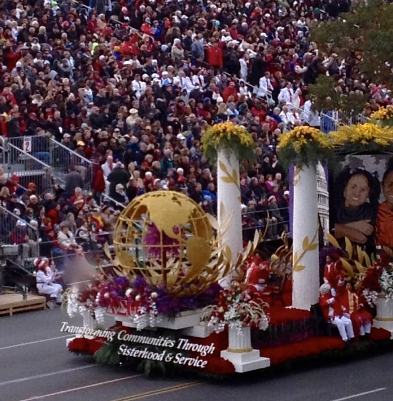Mad Men, 1968 and Caroline R. Jones are about change during an era on edge. Each offers insightful examples of how people create change, how they maneuver it, and the consequences of it.
Mad Men, AMC’s dramatic look at the sixties advertising world, is like a good novel or play exploring the constancy of change and its personal impact. The show has complex characters, captivating drama, plot twists, subtle symbolism, appealing settings, and historical overtones. It’s about the vicissitudes of life.
Like with a good book, play or life, the unexpected suddenly happens to wipe out any boredom. “The Flood,” episode 605 of Mad Men, exemplified that notion. In one scene, everyone was sleepwalking through life—greeting, chatting, and complaining about his or her table position at a posh event with Paul Newman. In the next scene, realism returned with a jolt. Martin Luther King, Jr. was assassinated. How was change maneuvered? The men and women of Mad Men reviewed their surroundings, their relationships and themselves. In turn, creator Matthew Weiner exposed unprepared viewers to forgotten history and nudged us to look inward, too. It was 1968.

Washington, D.C. (April 1968) – The ruins of buildings following the riots after the assassination of Martin Luther King, Jr. (Photo Credit: Library of Congress)
Nineteen sixty-eight was a year of challenges in America. Change arrived whether Americans were ready or not. Social consciousness heightened. Dreams exploded. Cities burned. Robert Kennedy was killed. Clenched fists lifted in rage. Civil rights demanded attention. Fears flourished. Women protested and eked out power. Shirley Chisholm became the first black woman to win a seat in Congress. And the advertising industry transformed. Ads and agencies adjusted to accommodate the temperamental times.
Caroline R. Jones changed the advertising world and pioneered multiethnic marketing. Her story was more a compilation of Don Draper’s work life on Mad Men and Peggy Olson’s personal life, and less like that of the black secretaries, Dawn and Phyllis. Caroline embodied Don’s mix of creative genius, aggressiveness, good looks, ballistic personality, charm, and urbanity while dismantling old advertising ways to co-found and build new agencies. As an African-American woman, she broke sexual and racial barriers moving from secretary to copywriter and beyond á la Peggy.
From the University of Michigan with a bachelor’s degree in English and science, Caroline headed to New York and began her advertising career as a secretary and copywriter trainee in 1963 at the prestigious J. Walter Thompson. She couldn’t type well, flunking the typing test twice, but she could write. With an encouraging boss who gave her creative latitude, Caroline moved ahead becoming the first black senior copywriter at J. Walter Thompson. She thrived by pushing through barriers, assuming executive positions with general market agencies, and accumulating many firsts including the first African-American female vice president of a major ad agency, BBDO.
Caroline continued creating change by co-founding and launching several agencies including Zebra Associates, one of the first full-service firms with African-American principals. At Mingo-Jones, she served as creative director on the “We do chicken right” campaign. Although the campaign was originally created to reach African-American consumers, Kentucky Fried Chicken (now KFC) made it a general market campaign — a groundbreaking move then and now. In 1986, she opened her own agency, Caroline Jones Advertising, where I worked with her for several years and set up the agency’s public relations division. Caroline was often asked what was it like at the top. She always responded, “It’s cold, but I can feel the sunshine.” At 59, she died of cancer.
Mad Men, 1968 and Caroline Jones reflect change then. But this is now. Will we resign ourselves to simply watching change? Will we learn the lessons history teaches about change? Or will we be the architects of change who ultimately feel the sunshine?





